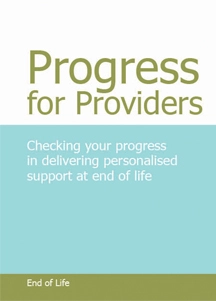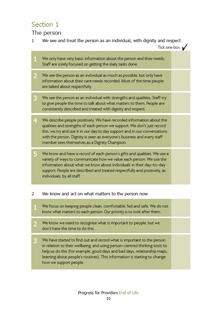
Progress for Providers – End of Life Checking your progress in delivering personalised support at end of life
Introduction
“Progress for Providers – end of life, goes a long way to making personalised support an achievable goal. It offers comprehensive and concrete suggestions. Personalised support will be increasingly important as we consider future needs for care and support at the end of life.”
Heather Richardson, National Clinical Lead, Help the Hospices
Progress for Providers End of Life is a self-assessment tool, primarily for managers and teams who are delivering end of life care at home, hospice or care home.
Being person-centred in your approach to end of life care helps the people you support to have more choice and control, and for staff to provide the best support they can in ways that reflect what is important to the person. Working in this way is not about doing more, but doing things differently.
End of life care is care that “helps all those with advanced, progressive, incurable illness to live as well as possible until they die. It enables the supportive and palliative care needs of both the patient and family to be identified and met throughout the last phase of life and into bereavement. It includes management of pain and other symptoms and provision of psychological, social, spiritual and practical support.” We are using the term ‘end of life’ to mean the likely last twelve months of the person’s life.
This Progress for Providers was developed by a group who included hospice managers, palliative care services managers, health professionals, and an adult social care commissioner. We consulted widely on the first draft through the Executive Clinical Leaders in Hospices and Palliative Care group (of nurses and clinical directors), Help the Hospices, hospice managers and social care staff. We then adapted this based on feedback and have tested it in a range of hospices and care homes.
In developing this Progress for Providers tool we have taken into account the Department of Health End of Life Strategy (2008); Supporting People to Live and Die Well – a framework for social care at the end of life (2010); the National Institute for Clinical and Healthcare Excellence (NICE) Quality Standard for End of Life Care for adults (2011); The Gold Standards Framework; Advanced Care Planning: A Guide for Health and Social Care (2008); learning from the Liverpool National Care Pathway for the Dying Patient; ‘Making it Real’ from Think Local Act Personal; The Adults Social Care and Public Health Outcomes Frameworks (2012)and Preferred Priorities for Care (2011); Patient Experience and the NHS Outcomes Framework Domain 4 ‘Ensuring that people have a positive experience of care’ (2011); CQC Outcomes and the Francis Report (2013). In the Appendices you can see how this Progress for Providers reflects a sample of these frameworks and guidance.

Publications
Section 1
The person
A Practical Guide to Delivering Personalisation – Person-Centred Practice in Health and Social Care
www.hsapress.co.uk/publications/books.aspx
Living Well – Thinking and Planning for the End of your Life
www.helensandersonassociates.co.uk/media/38837/livingwellweb-final.pdf
Section 2
The Environment
The Kings Fund Enhancing the healing environment (EHE) – Hospices brochure
www.kingsfund.org.uk/sites/files/kf/ehe-hospices-capital-grant-programme-brochure-2012.pdf
The Kings Fund Enhancing the healing environment brochure
www.kingsfund.org.uk/sites/files/kf/field/field_gt_document_link/enhancing-healing-environment-2012-brochure.pdf
Protected mealtimes & Patient safety (NPSA)
www.dignityincare.org.uk/_library/Protected_Mealtimes.pdf
Section 3
Friends, family, relationships
SCIE – Dying well at home guide
www.scie.org.uk/publications/guides/guide48/index.asp
‘Living without Emma’
www.amazon.co.uk/dp/0091923743
and ‘I want my mummy back’ both by Jon Nicholson
www.amazon.co.uk/Want-My-Mummy-Back-Familys/dp/0091923735/ref=pd_sim_b_2
Section 4
Person-Centred Practices
Department of Health Guidance (2010). Personalisation through person-centred planning
www.dh.gov.uk
Web resources
Section 1
The person
NCPC (2006). End of Life Care Strategy –The National Council for Palliative Care Submission. National Council for Palliative Care, August 1st 2006.
www.endoflifecare.nhs.uk/assets/downloads/Social_Care_Framework.pdf
http://publications.nice.org.uk/quality-standard-for-end-of-life-care-for-adults-qs13
www.endoflifecare.nhs.uk/assets/downloads/pubs_Advance_Care_Planning_guide.pdf
www.nhs.uk/Livewell/Endoflifecare/Documents/Planning_your_future_care[1].pdf
www.endoflifecare.nhs.uk/tools/core-tools/preferredprioritiesforcare
Section 2
The Environment
The Kings Fund – Enhancing the Healing Environment
www.kingsfund.org.uk/projects/enhancing-healing-environment
Social Care Institute for Excellence (SCIE) Dignity – Eating and Nutrition
www.scie.org.uk/publications/guides/guide15/factors/nutrition/index.asp
SCIE – Dignity – Privacy
www.scie.org.uk/publications/guides/guide15/factors/privacy/index.asp
SCIE – Dignity – Social inclusion
www.scie.org.uk/publications/guides/guide15/factors/socialinclusion/index.asp
The Kings Fund – National End of Life Care Programme
www.endoflifecare.nhs.uk/assets/downloads/RTS_Environments_final.pdf
gov.uk – Guidance on patient-led assessments
www.gov.uk/government/news/guidance-on-patient-led-assessments
Section 3
Friends, family, relationships
What Matters Now – an online space for those with life changing illness to keep families and friends up to date
www.whatmattersnow.org/
Booklet about home care for a hospice patient
www.partnersagainstpain.com/patient-resources/Home%20Care%20of%20the%20Hospice%20Patient.pdf
Macmillan Cancer Support
www.macmillan.org.uk/Cancerinformation/Livingwithandaftercancer/Relationshipscommunication/Relationshipscommunication.aspx
NHS Choices
www.nhs.uk/Planners/end-of-life-care/Pages/End-of-life-care.aspx
How to Care for Carers via eHsopice
www.ehospice.com/uk/ArticlesList/Howtocareforcarers061113015427/tabid/7131/ArticleId/5217/language/en-GB/View.aspx
The new normal isn’t normal (illness changes everything) http://blog.chron.com/loveandrelationships/2011/12/the-new-normal-isn%E2%80%99t-normal-illness-changes-everything/
The needs of carers
www.healthtalkonline.org/Dying_and_bereavement/Living_with_Dying/Topic/1197/
Section 4
Person-Centred Practices
Michael Smull. A series of films on each person-centred thinking tool
www.youtube.com/user/helensandersonHSA
Mary Beth Lepkowsky. A series of films on person-centred coaching.
www.youtube.com/user/helensandersonHSA
Section 5
Creating a person-centred culture
Michael Smull films for managers. ‘A Rock in a Pond’ and ‘Person-centred plans that make a difference’.
www.youtube.com/user/helensandersonHSA
Courses or consultancy
Section 3
Friends, family, relationships
Carers courses – information link via NHS Choices
www.nhs.uk/CarersDirect/workandlearning/learning/Pages/courses-for-carers.aspx
Carers Trust – information on courses and support
www.carers.org/
Carers Direct
www.nhs.uk/Carersdirect/Pages/CarersDirectHome.aspx
Courses or consultancy
Section 3
Friends, family, relationships
Carers courses – information link via NHS Choices
www.nhs.uk/CarersDirect/workandlearning/learning/Pages/courses-for-carers.aspx
Carers Trust – information on courses and support
www.carers.org/
Carers Direct
www.nhs.uk/Carersdirect/Pages/CarersDirectHome.aspx


